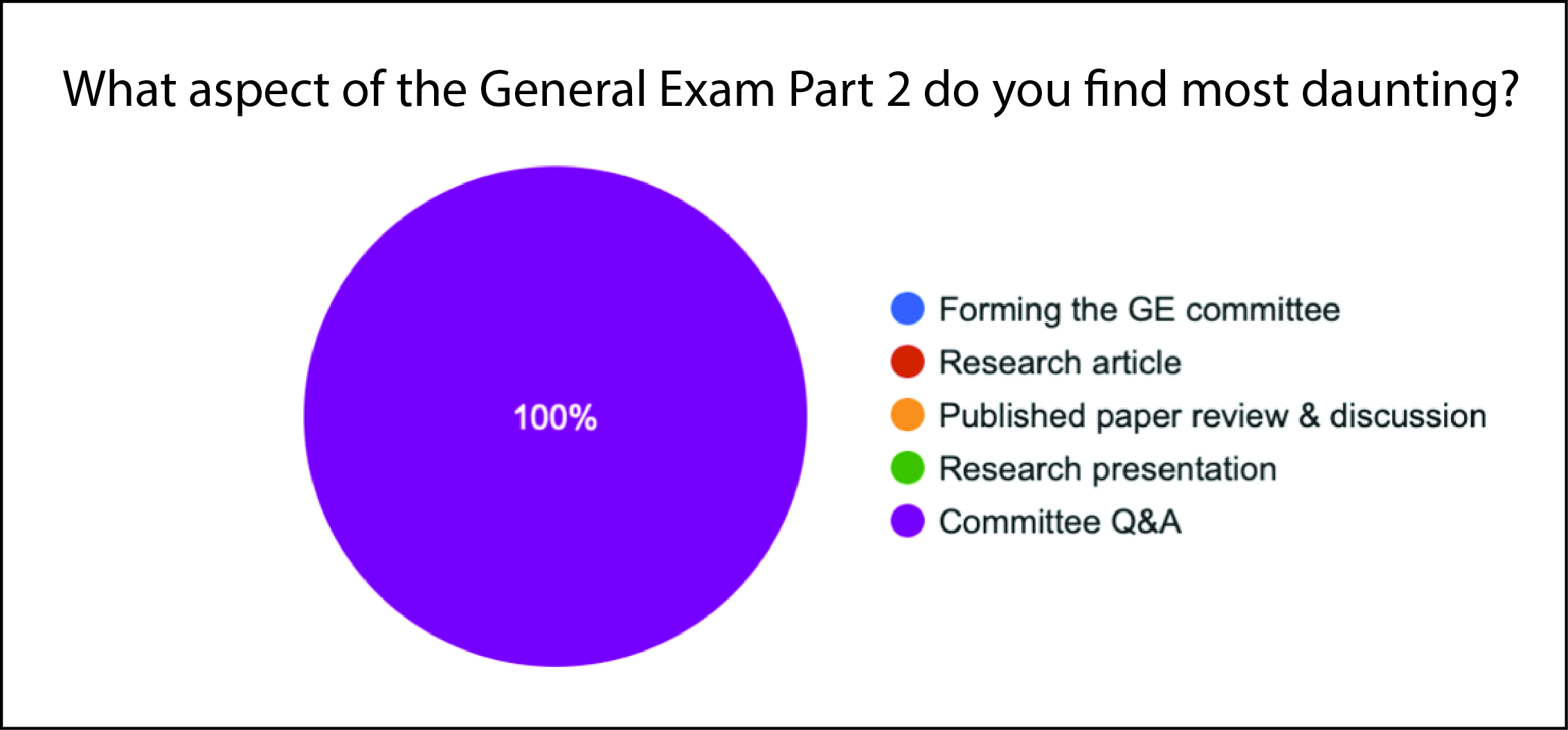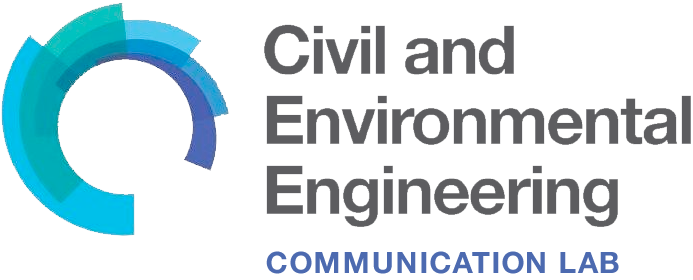by Matthew Goss, CEE Communication Fellow
Tips for success
- Keep calm and carry on. Stay level-headed and use your reasoning to work through challenging questions.
- Anticipate and practice. Understand the types of questions you are likely to receive and practice accordingly.
- Understand your audience. Who’s on your committee? The different perspectives offered by the committee members will be reflected in their questions.
What’s the purpose of the Q&A session?
If you’re anxious about the Q&A section of the exam, you’re not alone! In a survey of grad students (n = 6) preparing for the General Exam in 2023, 100% of respondents rated the Q&A section as “the most daunting”.

Although intimidating, the Q&A portion has the potential to be the most valuable part of the exam. To paraphrase one faculty member we talked with: “The Q&A should be a conversation. It’s more about seeing a student think things through than getting them to recite obscure facts.” In fact, this conversation may often yield exciting new avenues to explore in your research. In your responses to faculty questions, you should be able to demonstrate that you understand how your work fits into the context of prior research, that you understand the novelty and limitations of your work, and that you can think creatively to try to answer challenging questions.
Analyze your audience
Your audience for the Q&A session is well defined by the CEE Doctoral Program Guide. Your qualifying exam committee will consist of:
- Your advisor
- CEE Professor who serves as Chair of the committee (selected by you)
- Professor from any department (selected by you)
- CEE Professor from outside your research area (selected by the department)
Considering the audience is important when thinking about what types of questions you will get and how you answer them. Your advisor may stay mostly silent throughout the session, since they are likely an important contributor to your research, and the focus of the exam is for you to explain and defend your work to third-party experts. The other committee members will ask the bulk of questions, often based on their relationship to your research. Professors with research similar to yours are likely to ask more technical questions that may assume specific background knowledge while the outsider professor may focus more on bigger picture implications of your work. If you haven’t met everyone on your committee before, it may be a good idea to introduce yourself in person or virtually ahead of time to help you understand their perspective.
The members of your committee will likely have different scientific backgrounds and therefore different levels of understanding of the concepts and jargon from your field (for example, what does “k” mean to you?). When answering a question, focus your responses toward the person asking the question, but remember to keep things accessible for everyone else by defining technical concepts, jargon, or acronyms when necessary.
Question categories
Questions can be grouped into three categories:
- Clarify: These questions ask you to clarify something that was not clear to the audience. These often stem from a simple misunderstanding or from curiosity into something that you skipped over. Assuming you understand what you’re talking about, these tend to be straightforward to answer.
- Justify/Explain: These questions explore the reasoning behind an aspect of your work. What assumptions does your method rely on? What are the limitations of your analysis? These questions require a thorough understanding of the process behind your results to answer.
- Extrapolate/Reach: These questions ask you to consider the implications of your work beyond your narrow focus or methodology. What would you expect if you extrapolated your results to a global scale? If you could use a different lab technique, what results would you expect? These questions push you to think creatively about your research process and the impacts of your work.
Answering tricky questions
A challenging question can be intimidating. However, structuring your answer can help you think it through and meet the needs of your audience.
Following the process above, start your answer by making sure you understand the question and taking the necessary time to think about it. For example, this may be a good moment to grab a sip of water. Do your best to respond and consider following up to see if your answer addressed their question.
What if they don’t agree with my results or methods? (Clarify or Justify/Explain)
First, avoid an emotional or combative response. While these questions may seem harsh, they’re ultimately trying to help better your science. Clarify which specific aspects they don’t agree with and think it through. You’ll probably agree (“That’s a good idea and I’ll have to try that out”) or disagree (“That’s a good point but as you can see from Figure 2, we’ve actually already accounted for the error introduced by this assumption…”). Either is fine but your response should be well-reasoned.
What if I don’t know the answer? (Justify/Explain or Extrapolate/Reach)
From the CEE Doctoral Program Guide: “The committee members should push questions to the point at which the student says, ‘I don’t know.’” So, it is indeed expected that you’ll get some questions that you can’t answer. This is okay. Still you should try to work through the question as best you can. Identify what aspects are important and try to address those parts of the question. Consider identifying how you would tackle the question if you had more time and resources (“I could answer this with an additional experiment that…,” or “If I had the equation for __, this would be relatively straightforward…”). And stick with saying true things. In other words, don’t make stuff up! Ultimately, the faculty want to see your process and reasoning as you work through challenging problems.
It’s also possible that the question is beyond the scope of what you would be expected to know for your field. While it’s best to try to answer the question, it’s okay to bring this up and explain why you think it’s beyond the scope of your work.
Practice
Everything becomes easier with a bit of practice. Try listing out what questions you would expect. Make sure to schedule a practice presentation and Q&A with members of your lab, coordinate with other members of your cohort to pepper each other with questions, or reserve a Comm Lab appointment and CEE Comm Fellows can ask you a few Q’s and help you deliver effective responses. While you probably won’t get the same questions in the real exam, practicing can help you think on your feet and feel more confident in addressing unexpected questions on exam day.
************
Looking back on my own general exam, I was certainly worried going in, but our discussion during the Q&A ended up shaping new research ideas and helped me contextualize the phenomenon I’m studying on a global scale. At the end of the day, you’ve done a lot of cool research and you know your stuff. You’ll do great!
Additional resources
Check out the full collection of free CommKit Resources created by the MIT CEE Comm Lab team.
